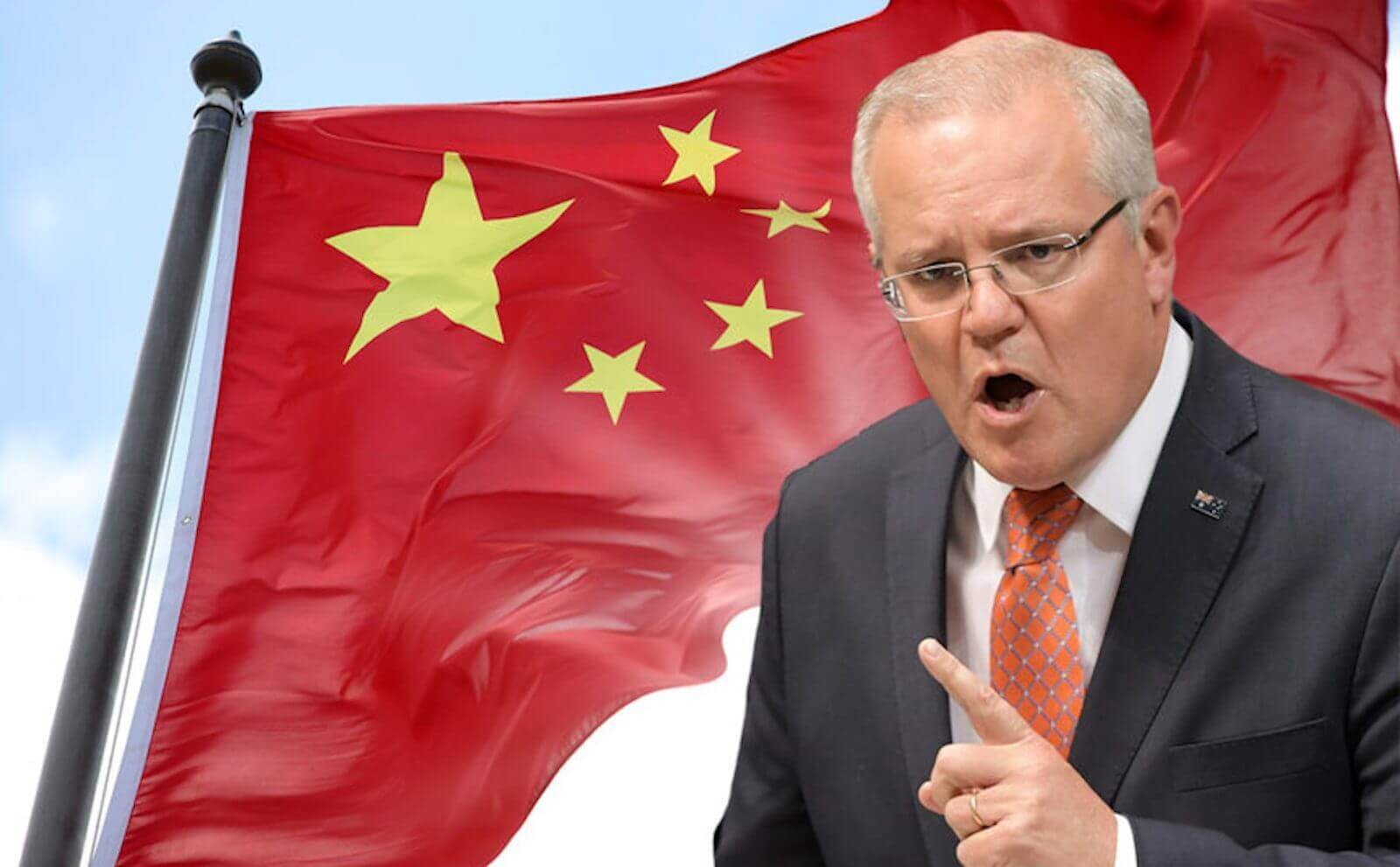After Australian Prime Minister Scott Morrison demanded an official apology from China over foreign ministry (FM) spokesperson Zhao Lijian’s decision to tweet a doctored image of an Australian soldier murdering an Afghan child, Chinese state-owned media denounced the Australian leader’s “ridiculous and shameless” demands, accusing him of ‘arrogance’ and of “slapping himself in the face”.
Global Times’ editor-in-chief, Hu Xijin, for instance, defended the FM spokesperson’s publication of the cartoon, saying that it merely sought to shed light on the murder of 39 innocent civilians at the hands of Australian soldiers. Rather than apologizing for the actions of Lijian, he said that Morrison himself should “kneel down on the ground, slap himself in the face, and kowtow to apologize to Afghans” in a “live telecast”. He further called the Morrison administration a “political hatchet man hired by the US”.
Likewise, another spokesperson for the foreign ministry, Hua Chunying, stood behind her colleague, saying, “Some Australian soldiers committed serious crimes in Afghanistan. These cruel crimes have been condemned by the international community.” She added, “The Australian side (has) reacted so strongly to my colleague’s Twitter - does that mean that they think the cold blood murder of Afghan innocent civilians is justified while other people’s condemnation of such crimes are not justified? Afghan lives matter.” She called on the Australian government to “bring the culprits to justice and offer an official apology to the Afghan people”, saying that it is Australia’s government who should “feel ashamed”, not China’s.
When responding to a question about Australia's "demand for apology" over diplomat's tweet, Chinese FM asked Australia:
— Global Times (@globaltimesnews) November 30, 2020
- Isn't it the Australian govt that dispatched troops to Afghanistan?
- Shouldn't the Australian govt feel ashamed over its soldiers' killing of civilians? pic.twitter.com/NMtNZpLNiB
On Monday, the Chinese foreign ministry spokesperson tweeted a digitally manipulated image of an Australian soldier standing atop the Australian and Afghanistan flags and holding a knife to the throat of a young Afghan child. The image has the caption: “Don’t be afraid, we are coming to bring you peace!” Accompanying the image, the FM spokesperson tweeted, “Shocked by murder of Afghan civilians & prisoners by Australian soldiers. We strongly condemn such acts & call for holding them accountable.”
In response, Morrison has demanded an official apology from the Chinese Ministry of Foreign Affairs the “repugnant”, “deeply offensive”, and “deeply outrageous” tweet that he said “cannot be justified on any basis whatsoever”. Likewise, Foreign Minister Marise Payne called it the most “egregious” form of social media misinformation she had ever seen, and remarked that she had been in touch with the Chinese ambassador to Australia, Cheng Jingye.
Afghan lives matter. Australian govt should bring killers to justice&offer official apology to Afghan people for its soldiers' killing of innocent Afghan civilians, Chinese FM spokesperson responded to Australia’s demand for apology over diplomat's tweet.pic.twitter.com/IxTfOeVea9
— Chinese Consulate General in Sydney (@ChinaConSydney) November 30, 2020
New findings from the Inspector-General of the Australian Defence Force (IGADF) report on war crimes committed by Australian Defence Forces in Afghanistan have revealed gruesome acts of violence against Afghan prisoners and civilians. The inquiry has recommended that 19 soldiers be subjected to criminal investigations by the Australian Federal Police (AFP) for 36 incidents that involve the murder of 39 Afghan citizens and the ‘cruel treatment’ of two others.
This is, in fact, not the first time that Lijian has criticized Australia for its involvement in Afghanistan. Just last week, he “strongly condemned” their actions and said that the Brereton report “fully exposed the hypocrisy of the human rights and freedom these Western countries are always chanting”.
This comes amidst rapidly fraying diplomatic and economic ties between the two nations, and China last week released a list of 14 grievances it has with Australia. The list includes Australia’s ban on Huawei from its 5G network, foreign interference laws, it calls for a global investigation into the origins of the coronavirus, comments on the South China Sea territorial disputes and human rights situation in Xinjiang, and accusations of cyber attacks by Beijing.
In response to these actions, China’s Ministry of Commerce (MOFCOM) has placed strict trade restrictions and even temporary bans on a number of Australian exports, including copper, wine, beef, barley, timber, lobster, coal, dairy, fruit, and oatmeal. It has also launched anti-dumping investigations against Australian wine and barley.
Against this tense backdrop, Morrison acknowledged that he is concerned by recent developments but reiterated his “respect” for the “comprehensive strategic partnership” Australia shares with China. He has previously said that Australia shares a “mutually beneficial” relationship with China and that it would continue to respect “China’s sovereignty, and their independence”, later adding that Australia is “not seeking to make an enemy out of any country; least of all China”. In addition, Agriculture Minister David Littleproud has said that Australia will not retaliate against China’s tariffs as a “trade war benefits nobody”.
Similarly, in a recent speech to UK think tank Policy Exchange, the Australian leader declared that he would not be drawn into making a “binary choice” between the United States (US) and China, and that Canberra seeks an “open, transparent and mutually beneficial relationship” with Beijing, who represents Australia’s biggest trading partner.
Hence, this week, despite demanding an apology for the Chinese FM’s tweet, Morrison has also said that he hopes that this “awful event may lead to a reset” in bilateral ties.

